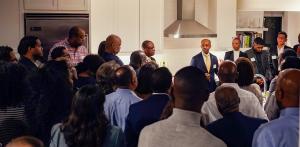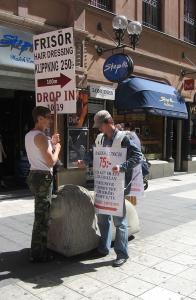 Yesterday, June 16, my wife and I did something we have not done in about three months. We got in our car (during the pandemic we did not drive either of our cars enough to prevent a visit from AAA to jump the battery of both of them), went first to a store and then on to visit a friend. No, the visit was not on Zoom (though we did have several zooms during the day and evening), but was an actual, live visit, first masked, then distanced and outside where we could talk and see one another’s face and lips with words flowing from each one of us in a real conversation. While the store visit adhered to the requirements of the time—on-line order, message to the store staff of our arrival in their parking lot, a staff member, masked and gloved, placing our book on a table, and disappearing back into the store, and then one of us picking the book off the table and putting it in our car—the friend conversation was all too real, all too genuine, all too delightful. I cannot begin to tell you how grand it was to sit in the warm sunshine of Los Angeles and actually talk to a friend. I could feel my shoulders relax, my breathing slow, my pulse normalize. I did not realize the simple pleasure of human interchange was so important to me.
Yesterday, June 16, my wife and I did something we have not done in about three months. We got in our car (during the pandemic we did not drive either of our cars enough to prevent a visit from AAA to jump the battery of both of them), went first to a store and then on to visit a friend. No, the visit was not on Zoom (though we did have several zooms during the day and evening), but was an actual, live visit, first masked, then distanced and outside where we could talk and see one another’s face and lips with words flowing from each one of us in a real conversation. While the store visit adhered to the requirements of the time—on-line order, message to the store staff of our arrival in their parking lot, a staff member, masked and gloved, placing our book on a table, and disappearing back into the store, and then one of us picking the book off the table and putting it in our car—the friend conversation was all too real, all too genuine, all too delightful. I cannot begin to tell you how grand it was to sit in the warm sunshine of Los Angeles and actually talk to a friend. I could feel my shoulders relax, my breathing slow, my pulse normalize. I did not realize the simple pleasure of human interchange was so important to me.
Now, before you accuse me of trivializing the moment, of seeking pleasant chats while thousands demonstrate for racial justice, and the virus continues to rage, let me suggest that human contact is a vastly underrated and vastly underappreciated necessity of what it means to be human. Surely, a huge part of those demonstrations, along with the absolute and one hopes lasting importance and significance of demanding equal rights for all Americans, especially black Americans, is the connections formed among the demonstrators themselves as they join their bodies and their voices in the acts of protest. One of the reasons the protests have been so lasting and large is the sheer fact of the isolation that preceded them. People needed desperately to get out of their loungers and chairs, and find other people to join them in solidarity for something larger than themselves. Netflix and Amazon Prime are great things, and my tiny family has watched our share of both, but as much as Diana and I love certain shows (particularly British crime dramas), and as much as we love watching them together, both of us need physical interactions as much or more as we need to witness complex TV characters strut their acting chops for our entertainment. Yesterday’s lovely interaction was proof enough of that fact.
Of course, as often is the case, the Bible speaks to this important human need over two millennia ago in its opening pages. In Gen.2:18, we read: “YHWH Elohim said, ‘It is not good that ‘adam remain alone; I will make for it a partner who is like it.’” From the very beginning of human creation, the ancient Hebrew writers realized that among the very worst things that could occur would be for anyone to remain alone. After the creation of ‘adam (the “soil creature,” not yet male or female), YHWH immediately recognizes that a partner is needed for this new creature. Traditional translations have obscured what sort of partner YHWH attempts to create, but the Hebrew text itself states that the partner (literally “one who helps or gives aid”) will be “like ‘adam” (literally “like in relationship to it”). Plainly, this partner is not secondary, not some sort of added “helper,” as too many translations imply. This one will be genuine partner, a real aid for ‘adam. Hilariously, the story goes on to describe YHWH’s first attempts to make this partner, but none of the myriad animals flying from YHWH’s potter’s wheel makes the grade (Gen.2:19-20), so YHWH goes back to the drawing board and this time “builds” (rather than the potter’s verb “formed”) from ‘adam’s side the appropriate partner, who becomes woman in contrast to the equally newly formed man (Gen.2:22).
The point of all this is that no human being should ever be alone; it is not finally a human condition to remain alone. It is, in short, not good, a simple but profound claim. Two other texts make the point. In Leviticus 13:45-46, terrible demands are placed on anyone who becomes a leper in Israel. Though it is obvious that the word used in Leviticus may have a far broader meaning than the disease we know today as Hansen’s disease, that horrendous affliction that causes huge physical deformities and required strict human isolation, the skin ailment Leviticus mentions, after diagnosis by a priest, required the following from the sufferer: torn clothes, uncombed hair, a covered lip, a constant cry of “unclean” to warn others of possible contact. Most terribly, “he shall live alone; his dwelling shall be outside the camp.” Clearly, the leper’s life effectively ended, as long as he was called leprous, because his human contact was over.
There is finally only one being in the universe who can be and can remain alone– YHWH. In fact, if Israel had anything resembling a creed, it can be found in Deuteronomy 6:4: “Listen, Israel! YHWH our God is YHWH alone!” The early theologians went out of their way to proclaim a God that needed no partner, a God who acted alone, YHWH who stood in isolation from all other gods. Eventually, this latent monotheism became more strict in formulation, trending from a kind of monolatry where YHWH ruled all other gods (see, for example, the two lists of the Ten Commandments where all are enjoined “to have no other gods before me” [Ex.20:3, Deut.5:7], implying that there may in fact be other gods), to the sharp statements of II-Isaiah: “I am YHWH, beside me there is no other” (Is.45:5). YHWH is alone and one, but human beings should not be alone.
I have some personal experience of what it can mean for a human being to be alone. When I was a pastor in Louisiana now over 45 years ago, I served as Associate Pastor to a highly successful senior pastor, whose main goal was the growth of the church. In the scant two years I served that church, there was only one Sunday I can remember when no one joined our congregation. During those two years over 600 people joined our church. My boss was a hard-charging sort of person who knew how to make churches grow. However, there was among our church members a group who could not add much either to the growth of the church or to its financial condition. Those persons were our members who lived in nursing homes. Advanced age and/or physical condition had forced these persons from their own homes and caused them to live, usually in one room, in a skilled nursing facility where they could be cared for as needed. My senior pastor had little interest in visiting such places, since there was little “payout” in such visits. I do not mean to paint my ministerial partner as cruel or uncaring; he was neither of those things. But he wanted to focus his finite time on church growth, and these people could not much help him there. So, it fell to me to do those visits.
I went to the three such places in our town that housed our members, and readily admit that I was not eager to go. I was not yet 30 years old, and had spent no time at all in nursing homes, my own parents being quite healthy, and the great majority of my friends hardly needing such places. However, what I found when I first went was a lively, if physically restricted group of very lonely people. Some had outlived all their relationships, both family and friends. Others never got a visit, or very few visits, from living family for all sorts of reasons—too busy, too uncomfortable around old people, and on and on. I soon discovered that my nursing home visits were among the most profitable things I did in my pastoral days, simply because those lonely people desperately needed a human voice and touch as they continued to live out their days. Spending time with them, learning about their sometimes fascinating lives, or just listening to common lives well lived, soon ministered to me as much or more as I offered ministry to them. That common human interaction, that simple conversation, assuaged some of their loneliness, and at the same time offered to me, the wildly busy pastor, time to slow my pace and to discover that in my overt busyness I was also sometimes quite lonely, too. Those visits taught me what the writer of Genesis had said so long ago; it is not at all good for anyone to be alone. As the pandemic loosens its grip, whenever that proves to be, do not forget that human physical interaction is a vital and crucial element of what it means to be fully human. Stay distant now, and wear your mask, but seek out human contact, for it simply is not good that any of us be alone.
(Images from Wikimedia Commons)











